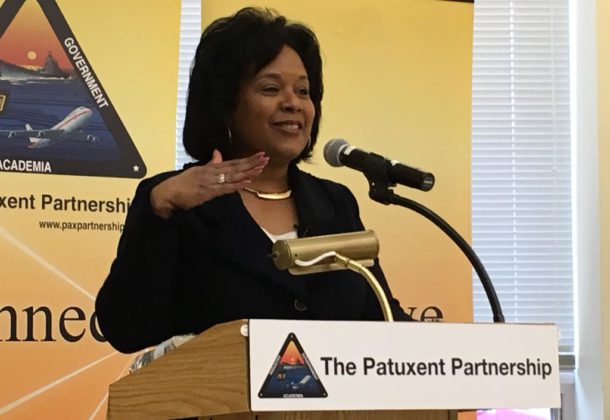Lockheed Exec Calls for Girls to Join STEM Fields

It’s a circuitous route to success, suggests Stephanie Hill, vice president and general manager of Lockheed Martin Rotary and Mission Systems Cyber, Ships, and Advanced Technologies.
The Patuxent Partnership, Leadership Southern Maryland, and the Chesapeake chapter of Women In Defense invited Ms. Hill to address “Principles of Leadership — It’s Not About the Glass Ceiling” last month in recognition of Women’s History Month at the Southern Maryland Higher Education Center in California, Maryland. The familiar venue for defense talks and briefings drew a typical-sized audience, approaching 100 attendees. Atypical was the reversed gender balance, with a dozen or so men in the audience.
“I question how we can keep a positive attitude if we keep bouncing off ceilings. I don’t think of ceilings. Believe in yourself. Focus on your track record, how well you’re helping the team. Choose the right attitude. I’ve never let anybody put a chip on my shoulder. … I don’t think we should talk about ceilings. Not that they don’t exist. I don’t think we should limit ourselves.”
Ms. Hill made clear her awareness of the challenges, and detailed a few she faced as a woman and an African-American, climbing to the executive level of a global corporation. She attributed her success to answering every challenge by asking herself, “Am I really living my purpose? Am I really doing what I’m supposed to do?”
While “at different times we serve different purposes” she explains how purpose should be expressed, “It’s not about finding purpose. It’s about infusing purpose into our life.”
Considering her purpose, she related, she once let pass a direct attack on her very presence on a team. “I want to know why she’s here,” a high-ranking team member demanded. She was one of only two women in the meeting, the youngest in the room, and the only African-American. “He had humiliated me, denigrated me in front of my peers. No one spoke. I decided to show him why I was there.”
By the time the project was completed and the leadership team met again, her former attacker let the team know “I don’t know how we went without Stephanie for so long.” She pointed out, “If I’d [given in] to a knee-jerk reaction, we wouldn’t have gotten there.”
Her purpose demanded, another time, rapidly extending her hand to require an admiral’s aide shake it. She’d been flanked by the other two team members, subordinates, and both white males whose hands the aide had shaken. She asked one of her team members later if he’d noticed anything unusual. After denying he had, at her suggestion, he admitted he had realized and understood what had happened. He hadn’t wanted to mention it because, he said, “I was so embarrassed for you.”
“Our purpose is to help others reach their purpose too,” she said.
Her family background includes an admired and purposeful mother who left her career as a kindergarten teacher to raise her three children, her father, Maryland’s first African-American senator and judge, grandmothers who were domestic workers, and grandfathers who were community stalwarts.
“My goal,” Ms. Hill repeats more than once, “is to show it can be done.”
Committed to STEM initiatives for young women, Ms. Hill believes one of the most significant challenges to drawing more students into the fields is to education their parents about engineering opportunities. Ms. Hill chanced upon her vocation, choosing a software class at her alma mater, UMBC, as an elective on the way to her accounting degree.
“I liked math,” she said, and knew of no other fields where it was valued. Then came the software class. “I loved it!” She still didn’t know engineers did this new thing. No one in her family or her friends’ families were engineers. She joked that her father asked if she was going to run a train. Later another woman in the audience said her family reacted the same way. “What? You want to run a train?”
“We don’t tell our stories,” she told the room, wrapping up her own affirming stories that turn on the conviction that women can have a demanding, fulfilling career and an involved family life as well. She doesn’t say it is easy, but her very presence insists it can be done well and with good humor.
Yet fewer girls are going into STEM fields today than when Ms. Hill joined Lockheed Martin in 1987. By second grade, she tells the audience, most girls say they are not good in math. They hear a mother say that and a girl believes it of herself as well.
“Get to the parents,” she encouraged the STEM professionals in the room. There is immediate need for these skills and high-paying jobs sitting empty for lack of qualified applicants. “Our nation is at a critical juncture.”























